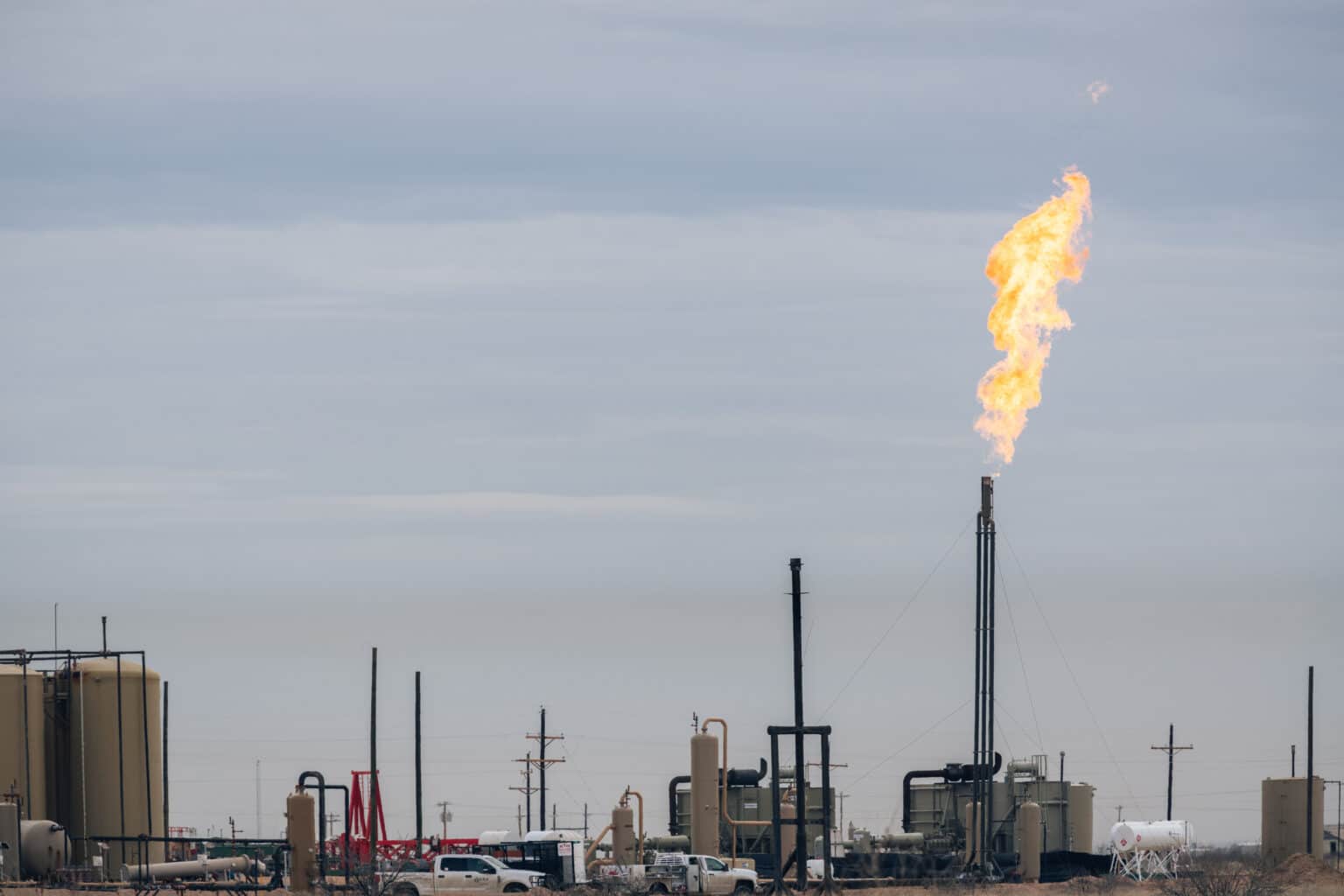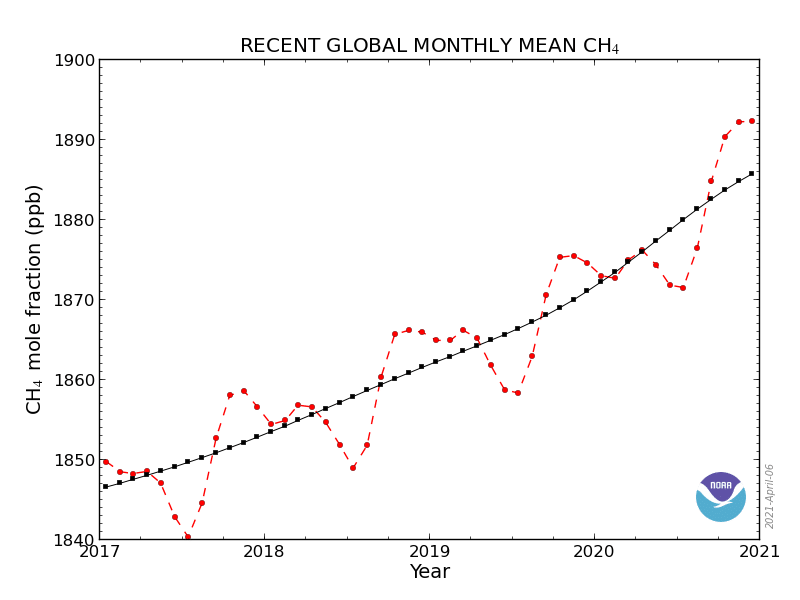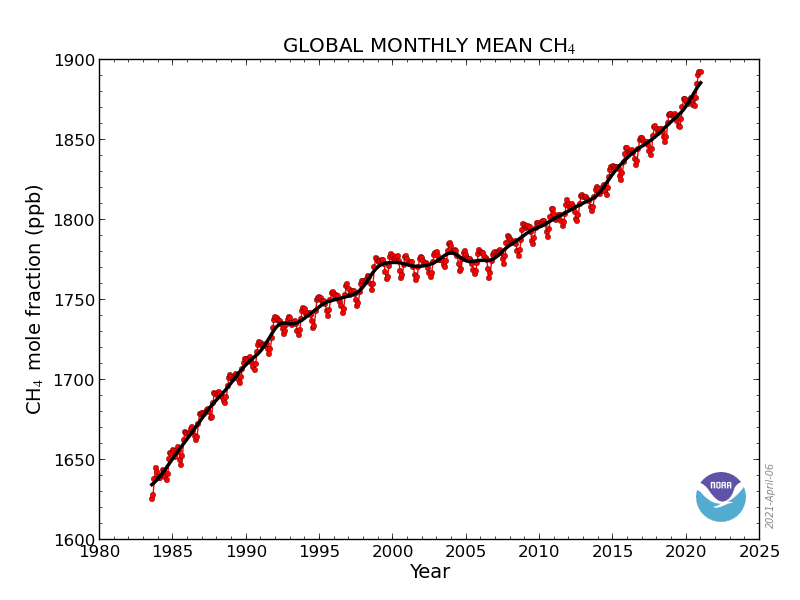Preliminary data shows that methane emissions jumped in 2020 by the largest amount since systematic record-keeping began decades ago. And despite a dip in polluting activities due to the pandemic, concentration of carbon dioxide in the atmosphere rose to its highest level in 3.6 million years.
The National Oceanic and Atmospheric Administration (NOAA) said that global methane concentrations shot up by 14.67 parts per billion (ppb) in 2020, the largest annual increase ever recorded, and a sharp increase from the 9.74 ppb rise in 2019. The data is an ominous sign that the world is badly off track in terms of reaching its climate goals.
“Human activity is driving climate change,” Colm Sweeney, assistant deputy director of the Global Monitoring Lab, a division within NOAA, said in a statement. The Global Monitoring Laboratory makes highly accurate measurements of methane, carbon dioxide, and nitrous oxide from four baseline observatories in Hawaii, Alaska, American Samoa, and the South Pole.
“If we want to mitigate the worst impacts, it’s going to take a deliberate focus on reducing fossil fuels emissions to near zero — and even then we’ll need to look for ways to further remove greenhouse gasses from the atmosphere,” Sweeney said.
Methane is a highly potent greenhouse gas — more than 80 times more powerful than carbon dioxide over a 20-year time-frame. But because it dissipates much more quickly than CO2, cutting methane emissions can achieve rapid climate benefits.
The data that NOAA released this month is preliminary and attributing the precise source of increased methane pollution is difficult. The data suggests that a large portion of the methane comes from fossil fuels, such as drilling, flaring, and other sources of methane leaks. But in a worrying sign, researchers think that some of the increase came from “biogenic” sources, such as methane leaking from wetlands or melting permafrost.
“That would, in a sense, be much worse as that sort of feedback — under which warming begets more warming — both is something we can’t easily control and would make our limits on greenhouse gas emissions to meet a given target even stricter,” Drew Shindell, professor of Earth science at Duke University and a former scientist at the NASA Goddard Institute for Space Studies, told DeSmog, commenting on the new study. “So in that sense it would’ve been preferable in many ways if these were from fossil fuels, but the jury is still out on that.”
At the same time, it’s important to point out that referring to biogenic sources as completely “natural” is misleading, Shindell cautioned. For instance, while leaking methane from thawing permafrost may be categorized as a “natural” source, it is the result of global warming, which is in large part driven by the combustion of fossil fuels.
On the other hand, because fossil fuel emissions are something that humans can control, the solutions are obvious to climate activists, scientists, and policy analysts. Flaring and venting methane at oil and gas drilling sites and leaks from fossil fuel pipelines and other infrastructure can be directly traced back to industry practices and permissive regulation. States could impose regulations that prohibit routine flaring, as Colorado and New Mexico have recently done.
If oil companies capture their methane instead of venting (directly releasing) or flaring it, they would have more gas to sell. According to the International Energy Agency (IEA), the oil and gas industry could cut methane emissions in half at no added cost, because leak reduction efforts could be paid for by capturing and selling the gas that would otherwise be burned-off or released into the atmosphere.
Shindell added that the good news is that there are multiple benefits to addressing methane pollution. In addition to slowing the rate of warming, cutting methane also reduces negative health impacts. “One of the great things about reducing methane emissions is that you always get large public health and ecosystem benefits as methane is a precursor to surface ozone formation, and that’s toxic to both people and plants,” Shindell said.
There is some movement at the federal level to cut methane pollution. In September 2020, the Trump administration scrapped requirements that oil and gas companies monitor and limit methane leaks from their infrastructure. However, an arcane procedure in the U.S. Senate called the Congressional Review Act allows for the repeal of federal regulations within a short period of time after the rule is finalized. Senate Democrats have suggested they may take this route after the April recess.
The U.S. Environmental Protection Agency may also use its authority to tighten restrictions on methane, although the formal rulemaking process is time-consuming. A proposed rule is expected in the coming months. The Biden administration is expected to release a new greenhouse gas reduction goal ahead of an April 22-23 climate summit. There is speculation that he aims to cut emissions 50 percent below 2005 levels by 2030, and the proposal would likely contain actions on methane.
As Senator Angus King (D-ME) said in a statement in March, according to The Hill: “When it comes to steps we can take to address climate change, limiting methane emissions is the low-hanging fruit.”
Subscribe to our newsletter
Stay up to date with DeSmog news and alerts









